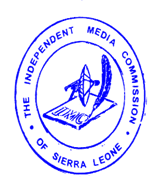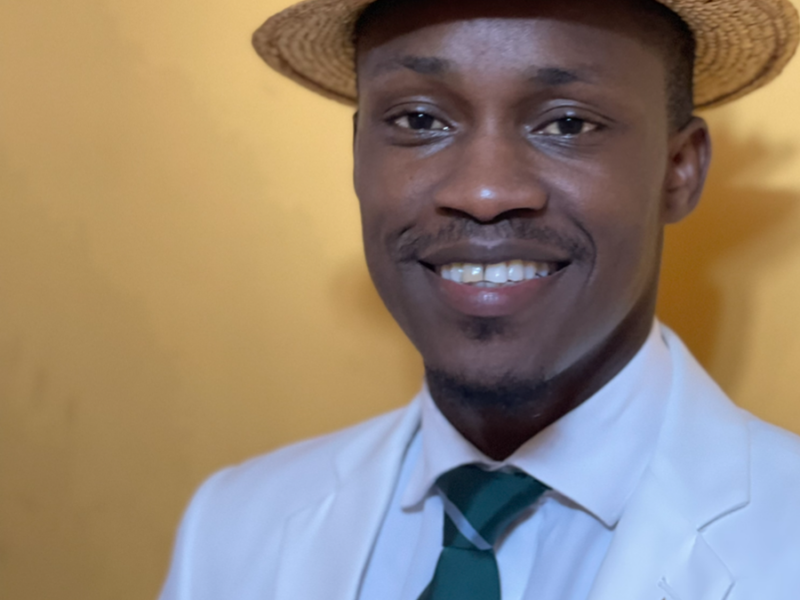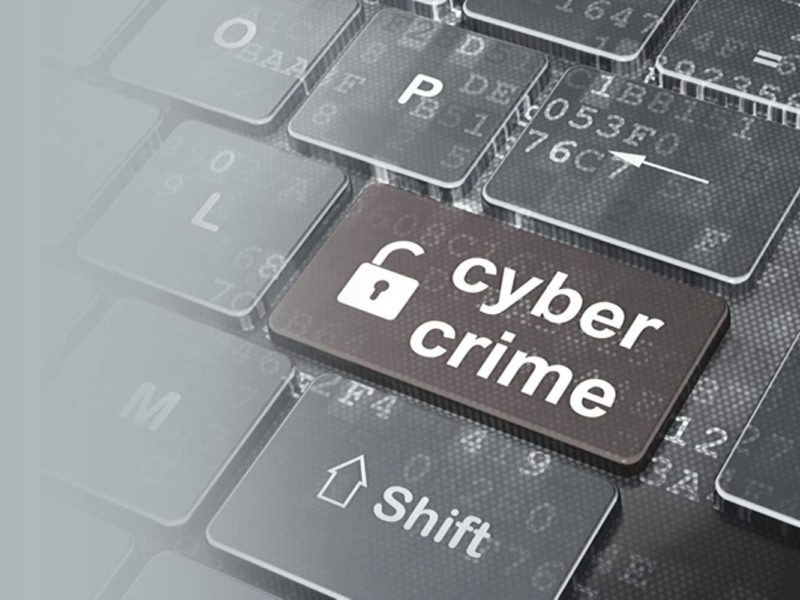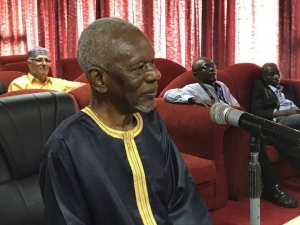Role of the Media in the Election Process in Sierra Leone
An Address on “The Role of the Media in the Election Process in Sierra Leone” delivered by the Chairman, Independent Media Commission (IMC) Mr. Rod Mac-Johnson at the Mamba Point at the one day workshop on the Biometric Voter Registration System/2012 General Elections.
Chairperson of this event – Mrs. Georgette De’Marke The Programme Manager of IFES – SL, Mr. Augustus Davies, Distinguished Members of the International Foundation for Electoral Systems – SL Distinguished Ladies and Gentlemen All Protocols observed:This is my first major public engagement since my assumption of the office as Chairman of the Independent Media Commission. It is a great pleasure for me to be here with you, following my acceptance of your invitation to share a few thoughts on the subject “The Role of the Media in the Election Process.”
There was a time when the national agenda was partly developed by a dynamic, creative, articulate and professional media consisting of National Radio and Television as well as newspapers; far fewer than we have today. Then, standards were high and there were models that we attempted to follow and sometimes almost worship, because of what they stood for in society. Truth, Diligence, Excellence, and Honesty were the watchwords of many media professionals. Some of the state-owned media institution like the former “Daily Mail” and programmes of the then Sierra Leone Broadcasting Service and their related producers like the Director John Akar and his MY GUEST programme or other indigenous language producers like Salako Maxwell were just a few of the media stars that Sierra Leone could boast of in those days.
Today, as a result of our recent repressive past, Sierra Leone has developed one of the freest media in West Africa and beyond. An estimated 64 radio stations, 66 newspapers, and 2 television stations. Many of these largely owned by private, commercial and or religious interests, with quality on average that leaves a lot to be desired and a lot more work required in the development of local creative programmes. Programmes that respond to the real needs of millions of Sierra Leoneans. Many of our media professionals require training, and for those leaving institutions like the University of Sierra Leone – their aim seems to be the private public relation firms, as opposed to the hard reality of being a journalist on the beat, that is a practicing media professional in a newspaper or radio or television. Unfortunately, some media professionals are more interested in internal character attacks on other newspapers to perhaps aid sales. There is evidence of private citizen character assassination, mainly to settle scores for unknown institutions and people. We have very little investigative or development journalism largely due to the limited creativity of professionals to tap the available financial resources to research and write such stories. Getting a good story is hard work and not many people want to do hard work these days.
There is also the need for greater creativity and imagination in knowing how best to work with international development agencies, the public and private sectors to sufficiently tap into the wealth available locally to sustain a creative media. Salaries of media professionals are low and sometimes have led to some poor examples of journalistic extortion by untrained practitioners hounding businessmen and women for support. It is a media dependent on commercials from the private sector or development agencies for survival and therefore not too critical of some of the actions of big companies and the private sector. The attitude by some is “Let sleeping dogs lie.” There are of course several examples of today’s media that do not fall into that category. They are the institutions that against all odds are practicing the profession with diligence and great skill.
You may be wondering why I have started this address on the role of the media and the elections, by describing today’s media in Sierra Leone. The simple answer is that you need to know what the media is like today, to fully assess whether it will be able to perform the key tasks it should carry out in 2012.
Let me try to give a response to the topic by addressing 3 – 4 broad areas that the media needs to address in any context of National Development, especially for a nation like ours.
First, the media must be seen as a key vehicle through which the people of this nation receive “information about the state of the nation, its development and its performance.” The media should and will need to continue its prime role of “watchman”! The media has been trying to play that role but many times, has been concentrating on things which the public is not very interested in receiving. In a recent study conducted by the Monitoring, Research and Projects Unit of the Independent Media Commission, we found out that in reviewing 10 out of 21 newspapers we buy each day:
- The bulk of the news, featured local and international sports coverage nearly 40.3%;
- Coverage of politics accounted for about 13.3%
- Health and development information was about 10.4 %
- Shockingly, we found out that information on women and girls was less than 2%!!
- And some newspapers that were reviewed had less than 20% of any other content but advertisements!!
This was the character of the papers sampled in the 1st Quarter of this year.
So an important question for the media and the public will, can the media carry out its Watchman role and provide more relevant and importance information before, during and after the elections, so that the people of this nation are professionally served by the media?
So, within its watchman function the media has several roles to play:
a) It will have to play the role of being a fair and honest observer of the Elections. There should be no doubt about the media’s independence. The media will have to be unbiased, accurate, balanced and honest in its reporting of the issues surrounding the elections.
b) It will have to produce credible and impartial stories and information, so that readers and viewers can make sound decisions on how to vote and who to vote for.
c) It should be fearless in its attempt to investigate and expose issues that the public need to know of.
d) It will have to give accurate information as per the roles of the National Electoral Commission in announcing results of the elections and provide an up to date flow of information on the process.
A second important role for the media is that of its “decision-making function”. The media can play a part in the process of changing strongly held negatives attitudes, beliefs and norms. We still live in a nation where certain attitudes may hinder certain people from voting or even becoming interested in the political discussions that will ensue. How will the media encourage women to be active in discussing issues that affect them, demanding responses from potential leaders, in an environment in which women are seen but heard? Where they do not have a voice as decision-makers what will be the role of the media? Voters will be entitled to accurate and sound information about election procedures, the position of political parties and candidates. The media will need to provide this whether in the print or electronic media. The media will need to be courageous to tackle important sensitive issues of national development, or social and community development and governance that are hindering progress and provide a platform for a full discussion on the direction the nation is to take in its bid to be transformed.
The role for the media in this area will include:
a) The need to develop the skills to appropriately report the speeches of politicians and their manifestos if the general public is going to make sound decisions
b) The media will be expected to encourage and enhance a lively debate, not only among politicians but among the people of this nation in a free and open manner. This will mean that the attitude of wanting to know how the chief says a community is to vote, will need to be moderated by active involvement of community radio with local communities across the nation. With over 30 community radio including private and religious stations, there is a new demand on private ownership to work in a responsible manner in its use of the media. This can be done through positive sermons on religious stations – not incitement; health private sector debates – not just the use of private FM stations to the highest bidder for election coverage space!
c) The media’s role will be to ensure that the public is given every opportunity to understand and discuss key issues that will affect the nation in the next 5 years.
d) The media, be it print and or electronic, should play the role of maintaining peace and ensuring against conflict. We cannot go back to the old ways and practices but should learn from the mistakes of the past and move forward into a new future. Let the media not be the basis for new conflict and fear.
So a key question for the media in the months ahead, is whether it can play a role, of assisting the nation to fundamentally rethink some of the structures, and systems that we have in the way we govern ourselves. Is the current media competent to begin this type of dialogue? And how ready are we to use the media to listen to the feedback that we get from the people of this nation?
A third and important role for the media to play is that of its teaching function. In the normal context of national development, the media should begin to apply the various tools at its disposal, to support improvement in reducing literacy. We are not using the media sufficiently as a tool to facilitate a reduction of illiteracy in the nation. There is hardly any real evidence of distance education by radio, and very little use of Community Radios as a teaching tool for communities on basic issues that range from rice planting to community development extension. Even though we lack many of the new information technology gadgets linked to social media, it will be important for the media to effectively use the tools it currently has. How will SMS messaging be used in this nation by big telephone and mobile companies? What will be the effect of the new fibre cable links with greater access to broadband communication? Will we see the use of Facebook and Twitter as a form of communication?
If we just deal with what we have right now, then what role will the media have?
a. Community Radio has been a significant development in this country and the 2012 Elections provide a major opportunity to use community radio for a variety of activities before during and after the elections. They can be used:
- Platform for politicians of all parties to freely share their positions and manifestos with listeners in the immediate range of their signals
- Community debates and discussions on important political issues
- Properly managed and structured Phone-In programmes with officials from NEC helping to rightly inform the public and the electorate
- Community radios should be encouraged to provide equal access to all groups through carefully planned and timed programmes to avoid dissent and conflict between communities and parties and politicians.
b) Television should be used to support voter education, long before the actual days of election. The use of this very important tool will be critical especially to highly populated areas. The media will have to be extremely sensitive in its portrayal of Government information and political coverage. Bona fide news should be covered without giving the impression of bias to the Government of the day. Choice of material by the media should be as a result of its importance and not because an outside source has requested or demanded it.
c) Many other visual aids and materials will be used during the elections including, stickers, posters, charts, banners, handbills, electronic billboards and promotional materials to be won by supporters and souvenirs will be designed by media institutions and public relations firms. It will be important that they are guided by the Media Code of Practice, recently revised by the Independent Media Commission, to assist the public and media institutions as they prepare for the event.
Fourth, I wish to address the issue of the media comportment during the elections. If the media is to be respected and seen as credible, then much of the inter-newspaper and radio rivalry between papers and stations would need to end, so as to concentrate on issues of national importance. Media institutions and their staff are not the news but they research and share with the public The News. That is, things that are of real interest to the public. The media will have to avoid the carrying or portrayal of offensive references directed at political opponents. They will need to avoid ridiculing, demonizing and/or stigmatizing people on the basis of gender, race, class, ethnicity, physical and/or mental disability even when paid by detractors to do so. These are challenges that the media will be confronting as it carries out its role in being a fair and independent observer of the development in the nation.
Fifth, the Independent Media Commission is playing its modest role to prepare the media for the roles it will have to play through an:
- Improved understanding and application of its regulatory functions together with other related institutions like NATCOM;
- Targeted training in the key areas of weakness among personnel and institutions
- Improved mechanisms for monitoring and trend analysis especially through some new and exciting publications and its Media Monitoring, Research and Projects Unit;
- Training of field monitors to effectively assess the media and its performance;
- Improved collaboration with institutions such as the Sierra Leone Association of Journalists, the Editor’s Guild and the Independent radio Network to ensure effectiveness of media performance and delivery of its services.
We are also working closely with several local and international partners, to ensure that our mandate is maintained and supports the ever growing media constituency.
In conclusion, let me say that the media has played an important role in the past, to build this nation and I am hopeful that 2012 will not be an exception. We will confront the challenges, we will overcome the obstacles and we will succeed.
I thank you for your attention.
Rod Mac-Johnson, Chairman, IMC 26th October, 2011Stay with Sierra Express Media, for your trusted place in news!
© 2011, https:. All rights reserved.






